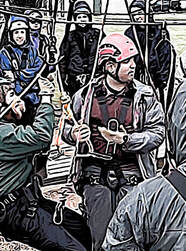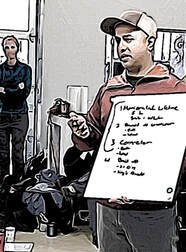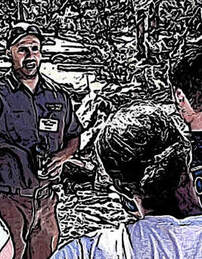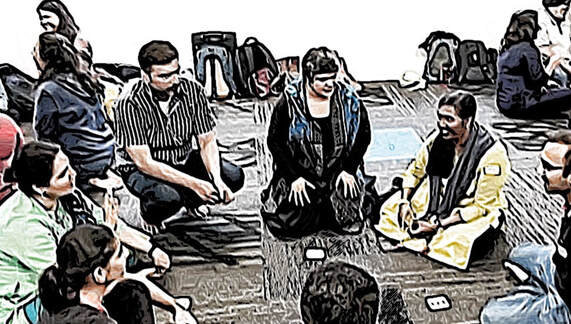|
*[A version of this article, 'Educators on the Course' was published in the ACCT newsletter a few years ago. I wanted to add it here at OTB to keep it alive.]
Do you consider yourself a team builder? Okay, how about this, are you an educator? The answer will depend on factors like our clients’ objectives, program phylosophy, and/or one’s personal approach to team building (see, A Typology of Team Interactions). Specifically, when it comes to a personal approach, I have worked with two different types of team bulders over the last 20 years – the recreational and the educational. Please understand as you read on, neither type is better than the other. One’s approach will depend on the purpose and intended outcome(s) of a particular program.
When we are programming for recreational team building (we can be recreational team builders), there is no time spent reflecting on a group's (or client's) behaviors, interactions, and learnings from their programmed activities. For example, we provide adventures for groups (and individuals) like climbing programs, adventure races, and adventure park events without any planned reflection. In contrast, an educational team builder (facilitator) will spend time with his/her groups looking back on their adventures - reflecting and processing. Ultimately (and hopefully), helping them discover useful behaviors that are transferable to other areas of their lives. Historically, educational team builders, using ground-level games, initiatives, and high course elements, consider themselves to be 'facilitators' (mostly used as a generic term for someone helping a group move through learning experiences). But this is only part of the educational picture. As educational team builders it is important to know that being a facilitator is only one of three possible educational roles we can assume in connection with group learning. Most of us have come to understand that in the field of experiential education (as team builders, we find ourselves grounded in this field), facilitation is an integral part of its success and effectiveness. It is part of the experiential philosophy. Through adventurous activities, a purposeful facilitator can guide groups towards, and encourage exploration of, interpersonal and intrapersonal change.[1] Christine Hogan supports this perspective by noting that, “[f]acilitation is concerned with encouraging open dialogue among individuals with different perspectives so that diverse assumptions and options may be explored.”[2] Facilitators use “real time” experiences (those that just occurred) for such explorations. Put another way, experiential facilitators (i.e., team builders) provide social experiences, in the form of adventurous activities, to help bring to the surface the ways in which individuals interact with each other. These interactions are then reflected upon and discussed (processed), in order to determine if any changes need to be (or want to be) implemented. As educational team builders we facilitate “social education,” being different from, but closely related to “academic education.” Karl Rohnke and Steve Butler tell us that we get to teach “the basics of communication, cooperation and trust in a milieu of FUN.”[3] Again, facilitation is only one aspect of a typology of educational roles we can choose as a team builder. Once these roles are understood we can see that we move through a balance (or maybe in imbalance) of being an instructor, a teacher, or a facilitator depending on the demands of the educational experience. Here are some of the ways educational roles present themselves during a team building program: The Instructor: As an instructor, the team builder will be telling the group what needs to be done. For example:
There are some things within a team building program we do not want our participants experientially figuring out (e.g. How to belay). In most cases, the instructor is needed to set safe parameters for the group. The Teacher: The teacher provides direction and possibilities to explore without giving solutions. There are times when pointing a way can lead to great discovery. It's the nudge early on that can help produce take-aways for other 'facilitated' experiences. For example, a teach might say things like:
These little nudges might be all a group needs to move from where they are to a different perspective, to an answer, or at least to figure out what they were talking about isn't going to work. Often times, the teacher comes out when there is a time concern. The need (pressure) to 'get going' outweighs other aspects of the program. This is not good or bad, it's a choice. How this choice influences outcomes is the question. The Facilitator: Many of us understand this role as the educator who will "ask" and not "tell" - always asking questions or making statements, letting the group figure out the task on their own (or not). Some common facilitation strategies include:
When we take on, or move into, the role of facilitator, we also take the time to reflect or process the task once it is completed (or at other times during the group's experience). How did your planning go? Did you come up with a plan that everyone agreed to? How do you know? Did anyone find they had to change the plan? Why? What were some of the challenges you encountered during the task? What were some of the ways you solved these challenges? How did you work as a team? Together? Independently? What feelings arose during the task? Frustration? Excitement? How did these feeling affect your expereince? Were you successful? What learnings will be important for you to remember? What advise would you give the next group assigned this task? When we stay in the educational roles of the instructor and teacher, we are still educating, but we might not consider taking any time to reflect upon or process the task - we are providing information we hope will turn into knowledge and then learning for the group (some may know this 'hope' as The Mountain Speaks for Itself). For many different reasons, these educators might simply move on to what comes next in the plan, whatever that might be. However, could we as the educator, who instructed the group through a task, take some time to talk about it? Yes, of course. This is moving into the role of facilitator. Could a teacher do the same thing? Of course. So, an educator’s role is not cut and dry (unfortunately many educators think it is). Roles can change in relation to the context of the educational experience and the intended outcomes. But wait! What about a “leader?” The one “up in front” or “in charge” is often seen as a leader. Are they not educators? A number of publications in the adventure education field refer to the experiential educator as a leader.[4] As one example, Rohnke and Butler, in their book, Quicksilver tell us the “leader” facilitates the process and “the leader/facilitator doesn’t provide all the answers to the group; primarily the participants learn from each other." So, there are some who consider the one(s) responsible for/to the group to be the leader(s). However, this can be misleading. Peter Senge, writing during a wave of change around leadership, believed that the “new…leaders are designers, stewards, and teachers…they are responsible for learning.[5] Since we can easily say that all educators are responsible for learning then the leader is surely an educator. However, if you were to dig into the plethora of leadership books[6] available to us there is one key difference in the position of the leader – he/she is a part of the group being lead. The leader is part of the goals and objectives of the group, shares in success and rewards of the group’s accomplishments. Is, in fact, affected by his/her own leadership. So, yes, a leader is an educator, but will also choose between the roles of instructor, teacher, and facilitor while leading those willing to follow. As team builders and reflective practitioners [7] in the field, it is important to know how we can “educate” in relation to the context of an educational situation. We can instruct, we can teach, or we can facilitate. From a traditional experiential mindset we often take on the role of the facilitator. We provide our clients with educative experiences in order for them to learn from these experiences and each other. But are we always, or should we always be, facilitating? We must consider situations that call for other educational roles. Just like programming appropriate activities for particular objectives and projected outcomes, we, as team builders, can also choose the appropriate educational role to go along with an activity depending on the needs of our clients and the context of the experience. Since these educator roles came into focus for me, I have been more purposeful about them when programming participant expereinces. I don't believe, at this point, there is a 'balance' of the three - each one being used equally. Every program (context) will be unique. What I'm looking at is how I might be able to use the roles in different expereinces and, am I over-using a role, or am I not moving into a particualr role enough. Here's one example of this thinking: The Harness Demo. If you work with high challenge courses, you've been here. Typically, I would gathered my group, give everyone a harness and helment, then talk them through the steps while they responded with what I asked them to do (or not). I would help those who needed it and we would keep going. This is straight up an Instructor role. Here's what I've been doing now. I am wearing what my participants will be wearing - a sit harness and helmet in correct orientation. Each participant stands behind a harness helmet pile (I redirect poeple, if needed, to a more appropriate size pile). Then, I say, "Please put on your harness and helmet. It should look the way I am wearing mine. Most importantly, the waist belt should be above your hip bones. Ready go." This type of Harness Demo, to me, includes all three educator roles. The Instructor tells everyone where the waist belt needs to be. The Teacher is providing the end result. The Facilitator is letting them figure out the steps to the result. And, I've put the group into another 'team building' activity they can work through. When someone comes up to me and says, "Am I ready?" I can say, "Yes or No." If it's a, "No," this person can assess, identify a problem (with help from others), solve it (with help, or not) and check in again. When it's a, "Yes," I like to then observe what they decide to do - help others or not (for example). All great opportunities to talk about. Does this student-centered approach take longer than the Instructor-lead approach? In my experience, it takes about the same amount of time, but I have given them more of a group and personal learning experience. It doesn't take long to consider educator roles when programming. If we take the time, what else is possible? Footnotes 1]For a look at some of the philosophical foundations of adventure-based programming, see Miles & Priest’s (1999)Adventure Programmingand Nadler & Luckner’s (1992)Processing the adventure experience: Theory and practice. Another great foundational text, if you can find a copy, is Adventure Education(1990) by Miles & Priest, Venture Publishing. ISBN: 0-910251-39-8. 2]The quote is found on p. 10 of Hogan’s book, Understanding facilitation: Theory & principles. Even though Hogan’s book does not deal specifically with adventure facilitation, she provides a concise perspective on the historical roots of facilitation and where it is utilized. 3]Rohnke, K. & Butler, S. (1995). Quicksilver: Adventure games, initiative problems, trust activities and a guide to effective leadership. Dubuque, Iowa: Kendall/Hunt. This book is one of our adventure-based favorites. It includes a plethora of great activities supported by noteworthy theoretical content (academically speaking). 4]Specifically Rohnke & Butler’s book in Note 3 above and Priest & Gass’ “Effective leadership in adventure programming.” 5]Senge, P. M. (1990), The fifth discipline: The art and practice of the learning organization. New York: Doubleday Currency. The quote is found on page 340. 6]Some of the more prevalent authors on leadership include John C. Maxwell, Kouzes & Posner, Stephen Covey, Ken Blanchard, and Linda Lambert. And, if you take the journey, don’t forget to look at James Burns’ seminal work “Leadership.” 7] Schon, D. A. (1983). The refelctive practitioner: How professionals think in action. Basic Books.
What have you experienced with these educator roles? Leave us a Comment below to start a conversation.
Keep doing good work! Chris Cavert. Ed.D.
2 Comments
As an adventure educator and team builder, I am now a dedicated fan of, High 5 Adventure - The Podcast (I access through iTunes). A super-huge THANK YOU to High 5 (and Phil Brown) for putting the energy into this.
Recently, I listened to the episode: Tinker Talk - Facilitation Tips We Now Disagree With. It inspired me to think about expectations. The practitioners in the Tinker Talk episode talked about things they learned in their career that they don't necessarily believe are the only possible option any longer. For example, one of them talked about 'Artificial Source Goals.' These are the goals given or spoken to you, as the scheduled program facilitator, by the 'person-in-charge' wanting you to accomplish (often times in the absence of this said person). The goals are not coming directly from the group. When you start working with them, you find out these 'artificial' goals are not realistic. The group needs other skill development work before focusing on the goals you have in your hand. If the expectation is to meet the 'given' goals, how do you move ahead? Early on in my team building days, I would push through and try to pull out learning from my groups to meet the expected goals. Sometimes it was possible, other times not. But I was doing what was expected. Now, based on more time with groups, I do my best to work with the them where they are - often simply asking them how they want to spend their time in this learning context. Sometimes we can work with 'expected' outcomes, other times we work towards other ends. If other ends become evident, we travel this path. After the program, I inform the 'person-in-charge' what outcomes were accomplished and any of the connections they had to meeting the goals this person had in mind. Or, if there was no connection, I inform this person what the group did take away. (What happens after this conversation I'll save for another post.) My confidence to work with a group where they are comes from years of experience and being able to build trust with my groups (and the organizations I work for and with) in order to ask them what they need. Focusing on expectations (given to, or created by you), is related to the 'Ascending Reticular Activating System' - ARAS (a little summary of ARAS HERE). In a nutshell, what you think about, you focus on. (Some of you might recognize this as confirmation bias.) If we limit what we are looking for, we may miss something important. In the movie Zero Effect, Daryl Zero (Bill Pullman) says, "If you are looking for something in particular, you are likely not to find anything. However, if you're looking for anything, you're likely to find something." As team builders, how do expectations shape our programming, facilitating and processing? How about a simple check in before we dive into any of these aspects of engaging with our groups:
Expectations are neither good nor bad, they are simply another tool at your disposal. And, like any other tool you have, it's how you use it that counts. The Final Question: Expectations and Un-Expectations - how does this polarity or, dichotomy or, continuum relate to your practice? Love to hear from you. Share in the Comments!
Chris Cavert, Ed.D.
FUNdoing.com (Activity resources for Team Builders) TeamBuilderPowerUps (An online school for Team Builders) YoungTeamBuilders (The voices of young Team Builders) |
OnTeamBuilding is a forum for like-minded people to share ideas and experiences related to team building. FREE Team Building
Activity Resources OTB FacilitatorDr. Chris Cavert is an educator, author and trainer. His passion is helping team builders learn and grow. Archives
January 2024
|






 RSS Feed
RSS Feed